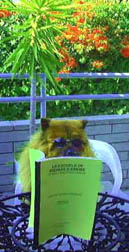|
Program & Admission Information
Manuel Antonio Beach, Costa Rica
|
|
|
|
|
|
|
 On the first day of class students are given an oral proficiency interview to determine their level. Based on this interview, they are placed tentatively in one of the six levels offered: Basic I and II, Intermediate I and II and Advanced I and II. Students can move up in level(s) according to their progress. Classes are from 8:30 to 12:30 or 13:30 to 17:30, Monday-Friday
On the first day of class students are given an oral proficiency interview to determine their level. Based on this interview, they are placed tentatively in one of the six levels offered: Basic I and II, Intermediate I and II and Advanced I and II. Students can move up in level(s) according to their progress. Classes are from 8:30 to 12:30 or 13:30 to 17:30, Monday-Friday
Once placed in a classes, students will experience the a total immersion methodology. Classes are conducted completely in Spanish. Classes are custom designed for each student, and the curriculum and texts are patented instructional materials.
|
|
|
|
|
Orientation:
NRCSA program will held an Orientation session locally. The orientation designed to provide students with important information about immigration, law of the countries, and the services offered by the school. The orientation program also helps you to acquaint to the educational and cultural atmosphere and provide an opportunity to meet other students.
|
|
|
|
|
Materials
Teachers use our own course book, developed by a team of our teachers, for about half of the class, while the other half of the class is devoted to special class needs and supplements, such as selected audios, videos, and current readings.
Teachers
All of our teachers are native speakers with university educations and are very experienced teaching Spanish to foreigners. Most have learned a second language themselves and understand the student's perspective. They are devoted to helping students best reach their goals and to keeping the classes enjoyable and entertaining.
|
|
|
|
|
|
|
Standard Spanish Program
Group 20 hours per week. During four hour sessions, in the morning or in the afternoon, students participate actively in small groups of no more than 6 students. Each student is assured attention to their individual academic needs. If total immersion becomes too difficult for the student supplemental instruction, in English, is available once a week. These sessions are specifically geared to clarify any questions in the material. Also free conversational classes are always offered for students to practice before and after class.
Following the total immersion methodology not only are classes are conducted completely in Spanish, but the interaction with families and the textbooks are also entirely in Spanish.
All the textbooks have been custom designed and are patented (with the Library of Congress in the United States) for their uniqueness. Each lesson in each textbook consists of four parts: "Let's get to know the culture" is an introduction to the Costa Rican or Latin American culture and introduces some of the items to be studied in vocabulary and grammar; "Let's get to learn the vocabulary" focuses in the learning of vocabulary; "Let's get to learn to grammar" analyzes and reinforces some of the grammar; and "Let's get to practice what we learned" is a general oral and written practice of what was studied in the previous sections.
Since a good number of students are either doctors or medical students, a textbook is also designed to accommodate students seeking Medical Spanish. In this textbook, medical students or professionals of the Medical field can learn vocabulary of the human body, illnesses, symptoms, etc.
|
|
|
|
| |
|
Admissions & Academic Credit
|
|
|
|
Students desiring credit for their study program should contact their home school or request the NRCSA Credit Fact Sheet. Generally, U.S. universities consider 15 hours of study to be equal to 1 semester credit.
For more information about academic credit in Spanish speaking countries, please click here.
For general information on academic credit, please click here.
Call us at 1-888-678-6211 to assist you with more details
|
|
|
|
|
|
|
|
 Cultural, Social & Fieldtrip Activities
Cultural, Social & Fieldtrip Activities
One day a week, students participate in a field trip that focuses on a social or environmental issue in the Manuel Antonio area or the town of Quepos. Nature lovers enjoy Costa Rica's remarkable diversity of birds, orchids, trees, mammals, fish, butterflies, frogs and other wild things within the exemplary national park system and private protected areas. The natural diversity is combined with a variety of outdoor diversions, which range from a horseback tour to a white water river run, from a hike through the forest to a deep water dive, from kicking back at the beach to learning Spanish and living with a Costa Rican family.
There are also cultural attractions to complement the natural ones, so a day in the rain forest can be topped off with a first class meal, or a night spent dancing merengue and salsa. And whatever part of the country you end up visiting, you'll be dealing with Costa Ricans; some of the most friendly and helpful people in the world.
|
|
|
|
|
|
|

